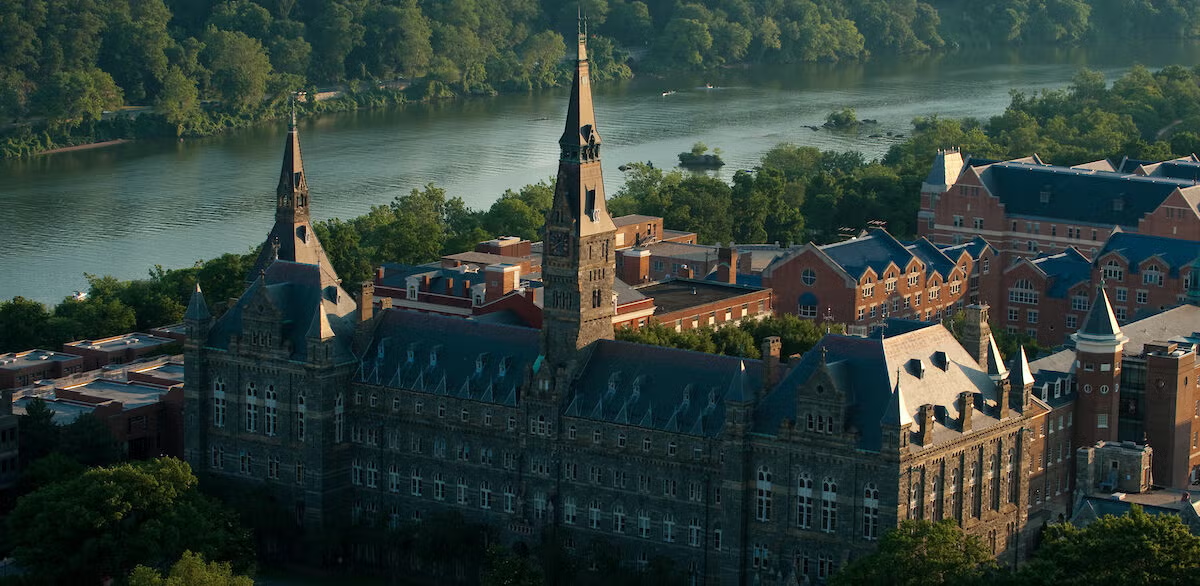Eight students are running for four at-large senate seats in the Georgetown University Student Association (GUSA), Georgetown’s student government, with voting open from Oct. 22 to 24.
Among the candidates’ campaign priorities are looser consequences for noise violations, the incorporation of student perspectives in the Village A redevelopment plan and improved dining and laundry experiences. The candidates are Luke Schneeman (CAS ʼ28), Youngsung Sim (SFS ʼ27), Nico Santiago (CAS ʼ27), Shae McInnis (CAS ʼ28), Evan Cornell (CAS ’27), Shea O’Day (CAS ’26), Scotty Lichamer (CAS ʼ26), and Wassan Abdelkarim (CAS ʼ28).

Schneeman said he will prioritize improving social life on campus by reducing the consequences for noise violations.
“My priorities are to reduce the consequences for first time noise violations and especially for first-time, off-campus noise violations,” Schneeman wrote to The Hoya. “Being able to invite friends over and host events is a big part of our college experience, and we should be able to do that without fear.”
Santiago, a current senator at-large, said he will work to increase occupancy limits in Vil A by building on the student life referendum that students will vote on from Oct. 22 to 26.
“I plan to expand upon the amazing work in the Restore Student Life Act by advocating for more reasonable occupancy standards on Vil A beyond the current 20-person limit,” Santiago wrote to The Hoya.
Schneeman said he would work to preserve the Vil A rooftops, which have emerged as a point of contention during the GUSA executive elections.
“The Vil A rooftops are important community spaces for Georgetown students and it’s crucial that we don’t lose access to them after the renovation,” Schneeman wrote.
Lichamer said he will work with the Georgetown Resident Assistant Coalition (GRAC), the residential assistants’ (RAs) union, to decrease consequences for noise violations and improve student life.
“I pledge to work alongside the RA Union and the university administration to lessen penalties and grant flexibility in the enforcement of noise violations, as well as fight to keep our rooftops in a remodeled Vil A,” Lichamer wrote to The Hoya.
“This includes working directly with university administration to ensure that student views are considered in preparation for this Georgetown Day, as well as the return of a fourth party day across campus,” Lichamer added.
Multiple candidates said improving student spaces is a priority in their campaigns.
Kim, a current at-large senator, said he hopes to continue his work on the Common Spaces committee, a GUSA group that works with the Office of Planning and Facilities Management and the Office of Residential Living to improve student spaces on campus, and the GUSA executive.
“In short, I’ve been helping GUSA exec to improve our student spaces, through increased seating in HFSC, hammocks and swings, escalating Henle door access and accessibility signage for construction,” Kim wrote to The Hoya. “My priorities include continuing to work on projects like increasing practice-room spaces for the arts, advocating for open access to student space and improving class registry sources for the student body.”
Lichamer said he would work with the administration to revitalize living and learning communities, residential communities based on shared academic, service or cultural interests.
“I aim to keep campus an active and inviting space by revitalizing dorm common rooms, continuing work on improving shared spaces on campus and working with administration regarding the return of living learning communities,” Lichamer wrote.
McInnis said he would focus on improving issues on Georgetown’s campus rather than on responding to national politics.
“I’m running for the student senate to focus on real, tangible changes that directly impact student life without getting sidetracked by national politics or issues outside our control,” McInnis wrote to The Hoya.
Santiago said he will work to improve the dining experience on campus.
“Although its significance may sometimes go unnoticed, our dining halls on campus are one of the main hubs that cultivate our community here at Georgetown,” Santiago wrote. “I am dedicated to making sure that all Hoyas have the best and most accessible dining experience possible by making our dining halls a place that students can be proud of.”
McInnis said he looks forward to working with students of all backgrounds.
“I plan to engage with students from all corners of campus, especially communities whose concerns often go unheard,” McInnis wrote. “That means showing up, listening actively and staying accountable.”